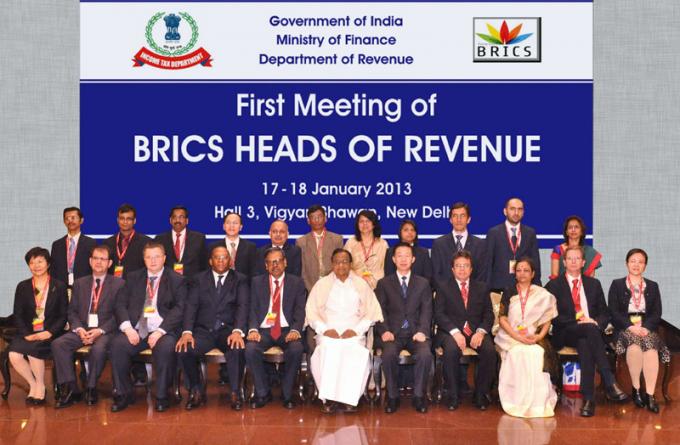
First Meeting of BRICS Heads of Revenue, in Delhi (2013)
The BRICS evoke images of emerging powers ready to team up and undermine global order, and the debate usually revolves around whether they will be able to work together or not as they seek greater responsibility in international affairs.
Yet the BRICS grouping is about much more than just glitzy summits and grand statements about how rising powers seek to change the world. Rather, intra-BRICS cooperation is shifting from a merely political outfit to a minilateral structure that serves as a platform for cooperation on many levels and at times highly technical issue areas.
Tax administration is an interesting example of intra-BRICS cooperation. In April 2012, BRICS Finance Ministers and Central Bank Governors met in Washington DC and agreed to develop a cooperative approach on issues relating to international taxation, transfer pricing, exchange of information and tax evasion and avoidance. Compared to other areas, tax cooperation is thus rather recent. At the first meeting, in January 2013, the heads of revenue deliberated on issues of mutual concerns related to tax administration, international taxation, transfer pricing, cross- border tax evasion and tax dispute resolution mechanisms.
They also identified a series of areas of tax policy and tax administration for extending their mutual cooperation, as reported in the joint communiqué – such as contributing to the development of International Standards on International Taxation and Transfer Pricing taking into account the aspirations of developing countries, strengthening the enforcement processes by taking appropriate actions for non-compliance, and putting more resources on international cooperation. Further actions include sharing of best practices and capacity building, sharing of anti-tax evasion and non-compliance practices, including abuse of treaty benefits
and shifting of profits by way of complex multi-layered structures, and the development of a BRICS mechanism to facilitate countering abusive tax avoidance transactions, arrangements, shelters and schemes.
There are two key questions that should be raised in light of these activities. First, is cooperation in the field of tax administration between the BRICS countries really useful? And second, is this type of cooperation a first step towards a more systematic cooperation in many other fields? It will take years before we can properly answer the first question – yet academics and journalists should assure that BRICS governments show how exactly these activities serve each countries’ national interests. While cooperation can serve as a confidence-building measure, critics are right to point out that the BRICS governments should articulate better what motivates intra-BRICS cooperation. Regarding the second question, there is some reason to believe that there is potential for wider technical intra-BRICS cooperation, especially considering that the BRICS all disagree on a whole range of global governance’s rule books. For example, why should the BRICS not be able to set up their own rules regarding development aid effectiveness, or develop joint proposals about how to amend existing rules?
Read also:
Is there potential for a BRICS security architecture?
Does intra-BRICS cooperation make sense? The case of public health
The politics of the BRICS Contingency Reserve Arrangement (CRA)
Photo credit: Press Information Bureau ,Government of India ,Ministry of Finance








